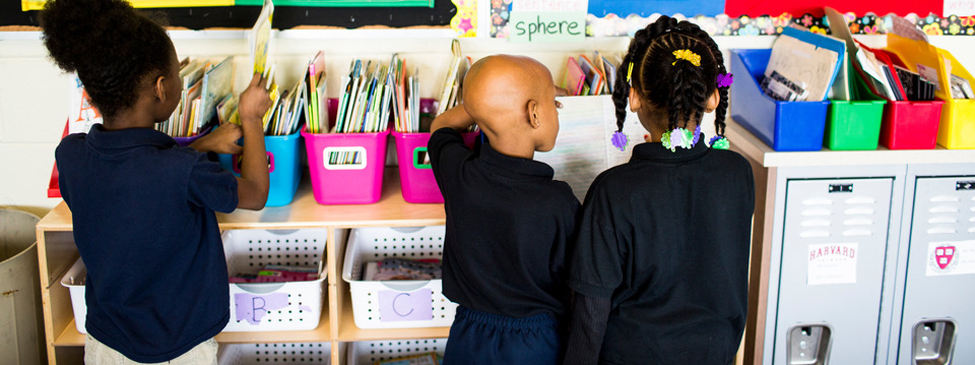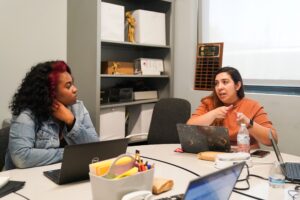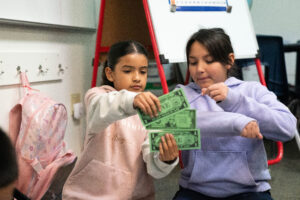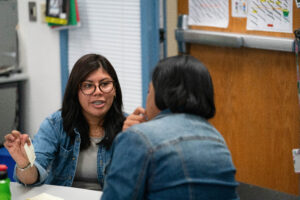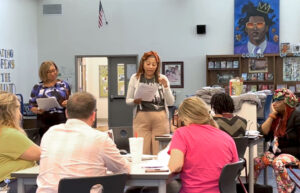Eric Hale is a 2016 Fishman Prize finalist and third-grade teacher in Dallas, Texas. Eric wasn’t dealt the greatest hand growing up in Phoenix, but worked hard to be in a position to help students like him. Upon entering the classroom, he had energy and passion, but lacked content knowledge and authentic relationships with students. Determined to be the teacher they deserve, he focused on improving. Last year, his sixth year teaching, more than half of his students entered behind grade level. By the middle of the year they scored more than 30 percent higher in math and science than the previous year’s class.
Every year, thousands of new teachers work hard just to survive their first year, never mind thrive in it. I know from experience. My first year, I almost left the profession because I wasn’t prepared for everything being an educator entails. We know that despite their best efforts, teacher preparation programs do not always do a great job of preparing teachers—particularly in schools in underserved communities.
But I also know—from personal experience—just how important it is for teachers to be ready to take on more than the nuts and bolts of lesson planning and classroom management. I grew up in Phoenix, Arizona. As an adolescent, my mom suffered from addiction and my stepfather was abusive. For a while, my family and I were in and out of homeless shelters. I came to school angry, sad, and frequently acted out. My teachers knew my situation, but never asked about it. They’d say, “Oh, little Eric, he's a good kid, but, man, his home life is rough.” Perhaps they didn’t know how to reach out to me, or how to bridge the gap between our experiences.
Then I met my seventh grade teacher, Mr. Gumpart. After I’d been acting out one day, he pulled me aside and said, “When you talk, everybody stops listening to me and listens to you. Has anybody ever said you were special?”
My answer was no.
That year, Mr. Gumpart did more than teach me. He built a relationship with me. He gave me books about Marcus Garvey, Malcolm X, and Haile Selassie: strong black leaders who accomplished great things after starting from bad circumstances. He pushed me to look to them as models for what I could become. Our relationship continued beyond his classroom and he became one of the reasons I was the first in my family to attend college.
Because of Mr. Gumpart, I worked hard early in my teaching career to build trust with students, many of whom come from backgrounds like mine, or who are only beginning to learn English. In addition to great instruction, I know they need support, love, and encouragement. But learning how to give them this isn’t always found in resources or books or teacher development workshops.
Anybody can learn the “science” part of teaching, but what about the heart part? Being a public educator today demands more. I’m no expert. But in my work to be the teacher Mr. Gumpart was for me, I’ve learned a thing or two:
Teach the whole child. It is extremely difficult to close the achievement gap if a student doesn’t trust you and have a basic understanding that you care about them. Invest time in the tough work of creating that relationship. If you see a student come into class despondent for a few days in a row or act erratic, don’t dismiss them or resort to punishments. Have a conversation; you might be surprised by the source of their behavior.
Keep simple rules. Most adults can only handle three tasks at a time. Why do we ask more from students? Instead of making up rules and guidelines for everything, create a few that govern your class. These are my rules:
- Talking is allowed as long as it is focused on the topic or concept at hand.
- Getting out of your seat to reference examples of high-quality work, get supplies, or go to the bathroom is fine so long as we have a mutual understanding that you will do what you need to and come back to engage in the learning.
- Stay ready, because you never know who might visit. I apply positive pressure on my kids by inviting principals, district chiefs, and superintendents to watch my classroom. This helps students remain consistent with the level of excellence it takes to impress.
If you want students to understand something, model it for them. You are the expert in the classroom. Do you have a high bar for student work that your classroom isn’t meeting? Create resources that show what excellence looks like and give students access to them. Do you want your students to feel comfortable speaking up and taking risks in class? Show them that you fail, and it’s okay. Create an educational environment where students view failure as an opportunity to do better the next time they encounter a similar task or problem.
Expect to be more than “just a teacher.” By taking this job, you are not simply signing on to teach. You will also be an advocate, role model, listener, reference… just to name a few hats. Instead of shying away from these responsibilities, dive into them. Often, students come to you about something because they don’t feel safe or comfortable going to anyone else. Respect that trust. Communicate frequently. Get to know the loved ones in their life, their customs, and their culture, and create shared vision of success.
I know from my own experience that teachers have the ability to change lives. If Mr. Gumpart thought of himself as “only a teacher,” I might not be where I am. When we look at the profession as just a job, students suffer—and we struggle. Instead, let’s strive to embrace our full job description, and be the teachers they deserve.
